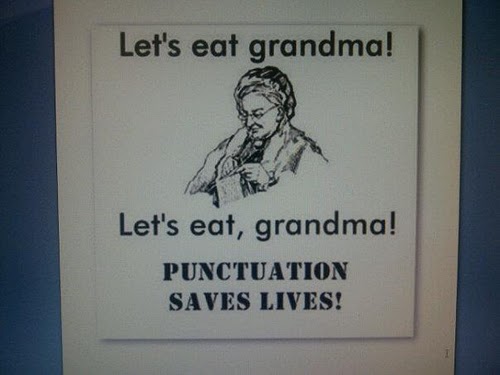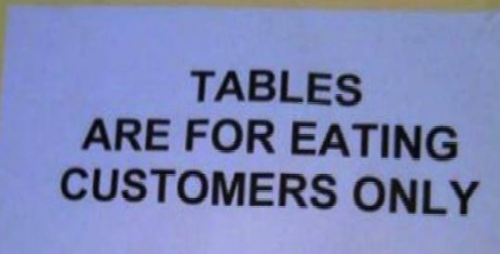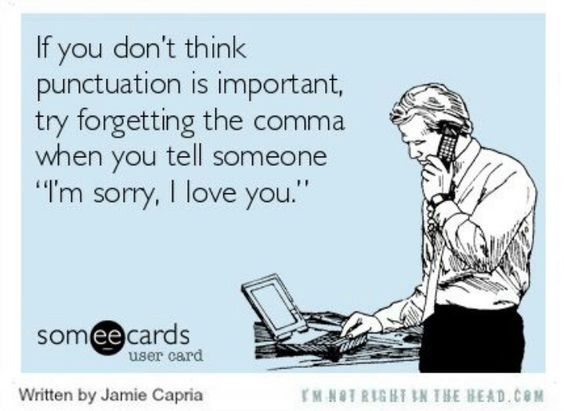Have you ever read a sentence and suddenly burst out laughing because of a tiny punctuation mistake? Those small marks—commas, apostrophes, and periods—might seem harmless, but when used wrong, they can change the whole meaning of what you’re trying to say.
In this post, you’ll discover some of the funniest punctuation errors that will make you see your own writing in a new light. Get ready to smile, maybe even cringe, and learn how a simple comma or misplaced apostrophe can turn your message upside down.
Keep reading—you won’t want to miss these hilarious examples!

Credit: www.dailywritingtips.com
Common Punctuation Mix-ups
Many people mix up commas and periods. A comma pauses a sentence, but a period ends it. Using them wrong can change a sentence’s meaning. For example, “Let’s eat, Grandma” is different from “Let’s eat Grandma.”
Another common error is with apostrophes. They show possession or make contractions. Saying “its” instead of “it’s” can confuse readers. “It’s” means “it is,” but “its” shows belonging.
People also confuse colons and semicolons. A colon introduces a list or explanation. A semicolon connects related sentences. Mixing these can make writing unclear.
Quotation marks get tricky too. They show speech or titles. Putting punctuation inside or outside the quotes can change the meaning. Remember, commas and periods usually go inside quotation marks.

Credit: nextstepscopist.com
Commas That Change Meaning
Commas can change the meaning of a sentence a lot. For example, “Let’s eat, grandma” means you want to eat with grandma. But “Let’s eat grandma” sounds like you want to eat grandma!
Another one: “I like cooking, my family, and pets” lists three things. Without commas, it reads like you like cooking your family and pets.
People often forget commas in lists or after introductory words. This can make sentences confusing or funny.
Here are three tips to avoid comma mistakes:
- Use commas in lists to separate items clearly.
- Place a comma after introductory words like “yes,” or “well,”.
- Use commas to set off extra information that is not essential to the main sentence.
Apostrophe Fails That Amuse
Apostrophe mistakes can cause funny confusion. For example, “dog’s” means one dog owns something, but “dogs” is more than one dog. Mixing these up changes the meaning.
Signs with apostrophe errors often make people laugh. Like “Welcome to the Smith’s” instead of “Smiths”. It looks like one person owns the place, not the whole family.
Another common error is using apostrophes for plurals, such as “apple’s for sale”. The apostrophe is wrong here; it should be “apples for sale”. Apostrophes show possession or contractions, not plurals.
People also confuse “it’s” and “its”. “It’s” means “it is” or “it has.” “Its” shows that something belongs to it. Mixing these causes funny, odd sentences.
Quotation Mark Misadventures
Quotation marks can cause funny mistakes in writing. Sometimes, people forget to close them. This makes sentences look confusing and strange. For example, writing “I love ice cream without the end quote leaves readers puzzled.
Another common error is putting punctuation outside the quotes. In American English, periods and commas usually go inside. Writing He said, “Let’s go”. is incorrect. It should be He said, “Let’s go.”
Mixing single and double quotes can also confuse readers. Use double quotes for main speech, single for quotes inside speech. Like this: “She said, ‘Hello!'”
Careful use of quotation marks helps writing look clear and neat. It avoids funny misunderstandings. Always check if quotes open and close properly.
Funny Period And Exclamation Mistakes
Funny punctuation errors often happen with periods and exclamation marks. Sometimes, people put a period where an exclamation mark should be. This can make a sentence sound less excited or even rude. For example, “Wow.” sounds dull, but “Wow!” shows real surprise.
Other times, sentences end with multiple exclamation marks. Like “Stop!!!” This can seem too strong or silly. One exclamation mark is usually enough to show excitement.
Sometimes, people forget to put a period at the end of a sentence. This makes it hard to know when the sentence stops. The reader may get confused.
Here are some common mistakes:
- Using a period after a question: “Are you coming.”
- Using an exclamation mark after a calm statement: “I have a pen!”
- Putting no punctuation at the end: “I like cats”
- Using too many exclamation marks: “Look out!!!”

Credit: www.pubspros.com
Frequently Asked Questions
What Are Common Funny Punctuation Mistakes?
Common errors include misplaced commas, missing apostrophes, and confusing periods with commas.
How Do Punctuation Errors Change A Sentence’s Meaning?
Wrong punctuation can make sentences unclear, funny, or even change the intended message.
Why Do People Often Misuse Commas And Apostrophes?
Many confuse their rules, leading to errors like comma splices or incorrect contractions.
Can Punctuation Mistakes Affect Professional Writing?
Yes, they can make writing look careless and reduce the reader’s trust in the content.
Conclusion
Funny punctuation errors show how small marks can change meaning. They remind us to check our writing twice. Even simple mistakes can make readers laugh or get confused. Paying attention to punctuation helps us communicate clearly. It also adds a bit of fun to reading and writing.
So, next time you write, watch those commas and periods carefully. Little details make a big difference. Keep your writing clear, correct, and sometimes a little funny!

